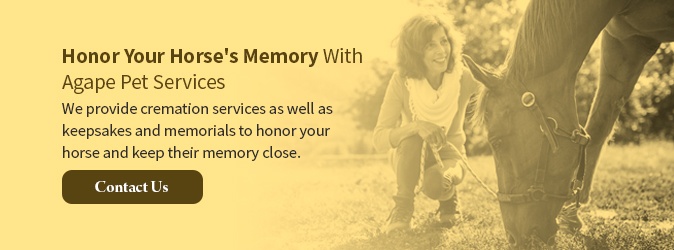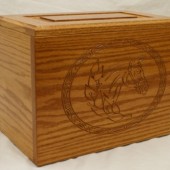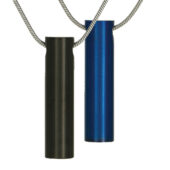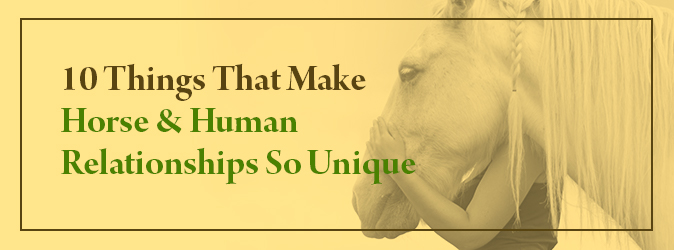
Horses are special creatures. They are majestic, strong and can display a broad range of emotions. Whether they’re around humans or other horses, they are amazingly communicative and thrive in social settings. These qualities are part of the reason why horses can develop such a strong bond with humans.
The relationship between humans and horses has a long history. As they have evolved and become domesticated, horses became a valuable source of transportation, labor and companionship. With qualities unique to their species, horses have become one of the few mammals that can form a lifelong, mutually beneficial and deep emotional connection with humans. Here are the top 10 reasons why horse and human relationships are so unique:
10 Things That Make Horse & Human Relationships So Unique
- 1. Horses Are Family Oriented
- 2. Horses Can Read Human Emotions
- 3. Horses Can Show Emotion
- 4. Horses Can Literally Impact the Human Heart
- 5. Humans Have a Natural Respect for Horses
- 6. Horses Can Help Humans Improve Physically
- 7. Horses Can Help Humans Develop Emotionally
- 8. Horses Can Help Humans Recover From Trauma or Disability
- 9. Humans and Horses Have Been Friends for Thousands of Years
- 10. Humans Naturally Identify With Horses
1. Horses Are Family Oriented
Even in the wild, horses are pack animals. They thrive in groups and suffer from loneliness, just as humans do. Herds of horses have a family structure and tend to stick close together. In the wild, horse family groups consist of one or two stallions, several mares and all of their foals. While stallions take possession over their herd, they are typically lead by an older, dominant mare. She isn’t necessarily the strongest, but is the most experienced, and maintains dominance through her attitude rather than physical intimidation.
As the foals get older, they break off into other herds. Colts form bachelor herds until they assert their dominance and begin a harem. Fillies either stay with their original herd, join another established herd or create a new herd with one of the bachelor stallions. Stallions can remain the leaders of their harem for a long time, and while the average is two years, some may last as long as over 10 years.
Because they are such social animals, horses need relationships to feel happy. A lack of socialization can have a negative psychological impact on a horse, especially young horses. They learn behavior by observing mares in a pack, and without a reference, they won’t gain the manners and skills that social horses develop naturally. People can satisfy some of a horse’s need for companionship through grooming and spending time playing with them.
2. Horses Can Read Human Emotions
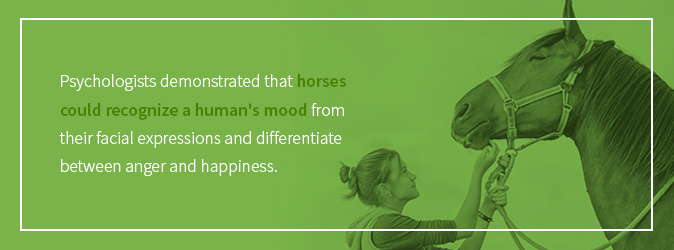
Beyond having a natural bond, horses can pick up on and understand human emotions.
Psychologists demonstrated that horses could recognize a human’s mood from their facial expressions and differentiate between anger and happiness. Without training the horses, the psychologists showed 28 horses several pictures of unfamiliar faces either angry or smiling. Then, they had the people from the images meet the horses, wearing neutral expressions.
In each case, the horses responded negatively to the people presented as angry and positively to those shown as happy. The findings show that not only do horses recognize and react to emotions, but they have a memory for them. They can remember how people presented themselves emotionally and respond accordingly. Horses are particularly socially intelligent. They are the first non-human mammal known to have the ability to recognize, analyze, respond to and remember human emotions.
3. Horses Can Show Emotion
Not only can horses understand the various moods and facial expressions of humans, but they can also communicate their own emotions. While they often talk with their ears and eyes, they show feelings through snorts and whinnies.
In general, snorts mean horses are happy or feel at peace. The more frequently they snort, the more comfortable they are. In a study in France, scientists put three groups of horses in different scenarios. Two groups were held in individual stalls, while the third was allowed to roam free in a pasture. The horses allowed to roam snorted often, as they were in a social and positive environment. When the horses in stalls were allowed in the pasture, they snorted twice as frequently.
As for whinnies, horses can convey positive and negative emotions in different intensities. Each whinny has two frequencies — one that describes the emotion, the other, the strength of the feeling. Paired with observations of heart rate, skin temperature and breathing pattern, scientists identified the kinds of whinnies horses make in different environments. Horses typically expressed positive emotions with shorter, lower frequencies and negative emotions with more extended, higher frequencies.
This kind of vocal communication may be a learned behavior or effect of domestication. Horses may have adopted these snorts and whinnies as a result of years of interaction with humans. By being able to display their emotions understandably, horses can create a deeper bond with humans.
4. Horses Can Literally Impact the Human Heart
Many riders agree that spending time with horses has a calming effect, but some scientific research suggests that it can physically change your heart rate.
One study measured the heart rates of humans and horses when horses were petted for 90 seconds. The small study featured three groups: One of six males with positive attitudes about animal companions, one with six males who had negative attitudes about pets and a group of six men who were in a horse riding club.
At the start of each petting sessions, the humans’ heart rates were higher than afterward. As the petting went on, the heart rate of the horses at first increased, but then decreased as the people continued to pet them. The authors of the study continued that petting horses can help to decrease tension and that an emotional interaction can exist between people and horses.
5. Humans Have a Natural Respect for Horses
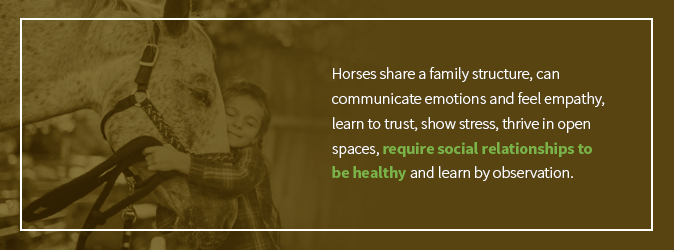
Horses command respect in many ways, especially with their stature. They are massive beings, with enough brain and brawn to intimidate people. However, they can trust and will allow people to approach them if they don’t appear to be a threat. Humans typically understand this dynamic and respect horses’ space and needs.
Humans also naturally respect horses because they can relate to them. Horses share a similar family structure, can communicate emotions and feel empathy, learn to trust, show stress, thrive in open spaces, require social relationships to be healthy and learn by observation. Not only do people have all of these traits, but they can also recognize them in horses, just as horses can read the same in humans.
Attitude has a lot to do with respect. Humans know horses will retaliate against poor treatment or resist people they don’t trust. Riders, groomers and owners all understand they have to earn a horse’s respect, as people have to earn each other’s respect.
6. Horses Can Help Humans Improve Physically
Horseback riding is a beneficial form of physical exercise for people. It’s unlike most other types of physical movement for humans, which means it targets different areas of the body than many other sports or exercises. A person can burn up to 200 calories when riding a horse for 45 minutes.
Horseback riding can help strengthen individuals in several ways, including:
- Core and trunk strength: To stay balanced while riding, a person’s muscles need to remain in specific positions to keep them centered and upright. Riding targets mostly muscles in the core and torso, including those in the pelvis, back and abdominal areas. It also helps train postural strength.
- Coordination and balance: As riders become more comfortable with their horse and transition from slow trots to gallops, they have to improve their balance. The faster a horse moves, the more challenging it becomes to stay balanced while riding. It takes a lot of strength and time. Coordination also helps the horse stay balanced, as the rider keeps their weight centered while the horse turns and shifts.
- Muscle flexibility and tone: The core muscles see most of the action in riding, but they aren’t the only ones to feel the burn. The pelvic and inner thigh muscles get the best workout, as the rider uses them for positioning and balance. Not only do they get toned, but the seated position also increases their range of flexibility. Riders can even see more tone in their arms and shoulders from directing the horse’s reigns. In terms of strength, the physical benefits are relatively similar to weight-bearing exercises.
- Cardiovascular health: As riders improve their technique and build muscle over time, they’re able to pick up the pace and allow their horse to run. Some even venture into speed and agility courses, where balance and directives become essential and need to come naturally. Faster speeds and different styles of riding require even more effort from the rider, meaning they expend more energy and start to see cardiovascular benefits. While they may be minimal starting out, they increase with riding intensity,
- Stable strength: For those who own and care for their horse personally, riding isn’t their only form of training and exercise. Stable work involves many weight-intensive and repetitive jobs, such as hauling hay, shoveling, lifting feed bags and leading horses. Considering these tasks are regular parts of daily care, they help build muscle strength and provide cardiovascular exercise.
With so many opportunities for physical benefit, horse riding and care are excellent forms of exercise. The horse and rider train together, growing a close relationship and providing one another with positive experiences. People don’t just benefit physically, either. The advantages of riding go deeper.
7. Horses Can Help Humans Develop Emotionally
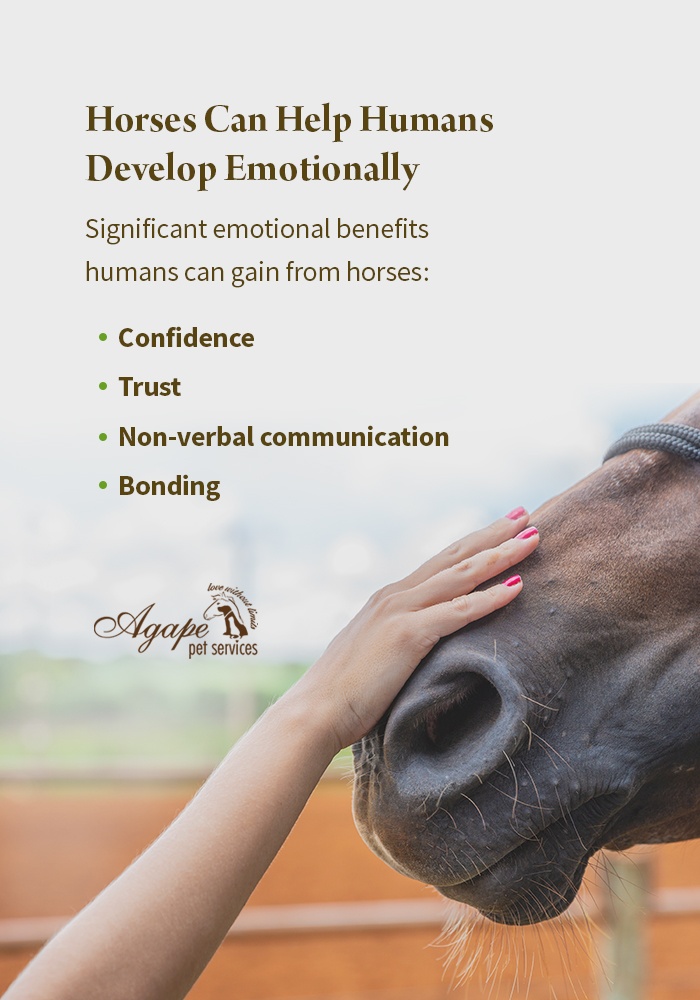
Riding horses can encourage several kinds of emotional development. From the initial stages of forming a human relationship with horses to learning how to train them, riders will gain a wealth of mental and emotional benefits from the process. It can help people open up and feel more secure in themselves or even overcome the adverse effects of trauma.
Some of the most significant emotional benefits humans can gain from horses are:
- Confidence: As individuals learn how to ride a horse, confidence is a crucial factor. Not only do they need to be assertive with directions, but they also have to get past the tendency to hesitate or doubt decisions. The feeling of being in control of such a large animal can make riders feel confident in themselves.
- Trust: Developing the ability to trust is essential to emotional development. Without it, people can feel isolated or like they have to keep to themselves. By learning how to cooperate with an animal, riders can learn how to trust their horse. As their relationship gets stronger, riders put more trust in their horse and can relax and enjoy their experiences.
- Non-verbal communication: Humans can talk to horses, but they can’t talk back. However, horses do use a lot of non-verbal signals and noises to communicate. They’ll also pay attention to body language, facial expressions and movements to understand people. Over time, humans and horses can develop a powerful way of communicating, without needing to resort to verbal cues.
- Bonding: Horses can help humans feel more comfortable socially by providing them with a bonding experience. Creating a strong relationship with an animal can help people feel more secure or confident about opening up to other people. They’ll learn the fundamentals of empathy and affection in a low-stress environment.
Humans are naturally social, and emotional development is vital to forming and maintaining strong relationships with others. Creating a bond with a horse is a perfect way to learn how to open up emotionally and understand the importance of patience, trust and communication.
8. Horses Can Help Humans Recover From Trauma or Disability
Humans can feel better just by being around horses, but they’re capable of much more than lifting spirits. Spending time with horses can be mentally and physically therapeutic. Equine-assisted therapy and hippotherapy are valuable forms of treatment for individuals with many kinds of disorders and diseases.
Hippotherapy can help with various forms of trauma and disabilities, such as:
- Cerebral palsy
- Down syndrome
- Austim spectrum disorder
- Multiple sclerosis
- Cerebrovascular disease
- Muscular dystrophy
- Traumatic brain damage
- Amputations
For individuals with disabilities that affect their muscles, horseback riding is a great way to tone, train and build underused muscles. It can also help with improving balance and fine motor skills. Horses walk and move with a similar gait to humans, so horseback riding can provide the benefits of walking to those who are unable to do so on their own. It also trains hand-eye coordination and builds other connections between mental and physical faculties.
Therapeutic horseback riding can also help with behavioral issues and emotional trauma in children and young adults. For young people who have been through abuse, forming a relationship with a horse can teach them trust. Children who have trouble connecting with others can learn valuable lessons about navigating social scenarios by bonding with a horse.
Riding horses has different benefits depending on what the rider wants to get out of the experience. Whether they’re looking for gentle physical therapy or a way to learn emotional skills, spending time building a relationship with horses can help people through recovery.
9. Humans and Horses Have Been Friends for Thousands of Years
The domestication of wild horses goes back thousands and thousands of years, dating to as early as 10,200 B.C. As humans began to tame and learn to ride horses, they became more and more domestic, meaning they remained close to humans of their own free will. Humans trained horses to transport goods and respond to riders. Over time, horses learned to pull wagons and buggies.
In addition to daily labor, horses were also vital during war times. They fought bravely alongside soldiers and helped transport crucial supplies. Horses do bond with humans and their relationship with soldiers was likely stronger than those developed prior, considering the highly emotional environment.
Currently, most horses are companion and therapy animals, meaning humans greatly value their relationships. Many individuals treat them as pets or keep a stable of horses to teach others how to ride.
10. Humans Naturally Identify With Horses
Horses have many similarities with which humans naturally identify. For one, a hierarchical system. In both human dynamics and horse herds, there is a hierarchy structure. Whether it’s in families, employment or government, people are consistently operating within a hierarchy. Horses also have a similar family structure as humans, where male and female horses stick together and their offspring leave the nest once they’re mature.
Horses are also communicative and expressive, much like people. They can display different attitudes and emotions, which makes them relatable to humans. In the company of people, horses can display happiness, stress, trust, worry and many other moods. They’re even able to make complex facial expressions. With the ability to convey and read emotions, humans can understand horses’ sentiments and horses can understand humans.
Honor Your Horse’s Memory With Agape Pet Services
We know the bond between horses and humans is a special one. Sharing a lifelong relationship with a horse is emotionally fulfilling and beautiful. It’s what makes saying goodbye incredibly difficult. Agape Pet Services wants to help you give your beloved friend a proper send-off. We provide cremation services as well as keepsakes and memorials to honor your horse and keep their memory close.
We’re here if you need us. For more information about how Agape Pet Services can help you, feel free to contact us.
